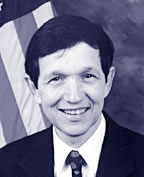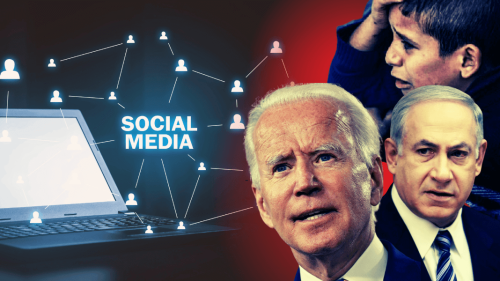Dennis Kucinich: Democrat in the Fray
 |
The movement against the Vietnam War reached its pinnacle in 1972 when Senator George McGovern won the Democratic Party's Presidential nomination. His incumbent challenger was President Richard Nixon. McGovern's platform primarily consisted of two things; withdrawing US troops from Vietnam and providing a guaranteed family income for every household. However, his candidacy fell well short of those lush lawns on Pennsylvania Avenue. He only garnered 37% of the popular vote-count and walked away with a measly 17 electoral votes. It was Nixon by a landslide.
McGovern may have lost the election, but his vision of pulling out troops and bringing back American POWs proved to be more than just a fantasy. In January of 1973, just over a year later, North and South Vietnam signed the Paris Peace Accords, which ended the United State's combat role in Vietnam. By February, many POWs began making their way home. The overwhelming opposition that had grown across America initiated Secretary of State Henry Kissinger's investigation with the North Vietnamese - which ultimately prompted US withdrawal.
The movement protesting the conflict played a direct part in providing the US initiation of those Accords. Although McGovern didn't capture the White House, his running for President was still a victory. The convictions he shared with millions of others inspired the stop to the war - which came to a bloody end in 1975 when North Vietnamese revolutionary forces took over the Republic of Vietnam.
Times have changed since the 70s. The Democratic Party of 2003 only bares the same name as its retro predecessor, not much else. It seems highly unlikely a McGovern of today could ever gain support within the present Democratic conundrum. Liberal politicians are a novelty these days. You can practically count on one hand the Dems that aren't card carrying members of Democratic Leadership Council (DLC), the corporate fundraising wing of the Democratic Party. Perhaps this elite guild would be more appropriately coined the "neoliberal junta."So when a real progressive Democrat decides to take on their fellow appeasers - it's worth giving credence.
And on February 17th it happened - Representative Dennis Kucinich of Ohio announced his decision to seek the Democratic nomination for President. As Co-Chair of the Progressive Caucus, Kucinich has been at the forefront in opposing President Bush's brutish foreign and domestic policies. His opposition to the Iraq invasion and Bush's dismantling of civil liberties make him undoubtedly the most progressive Democrat in the race. Kucinich hopes his leftist platform will excite grassroots activists into putting their energies behind his candidacy.
Indeed his spokesperson Doug Gordon says Kucinich is an activist himself. "Dennis protested the WTO in Seattle and marched in New York City and elsewhere opposing Bush's war on Iraq. He also organized two thirds of the Democrats in the House of Representatives to oppose Bush's resolution authorizing unilateral force [on Iraq],"Gordon recently told Left-Turn. "He's one of you, he's an activist with a progressive vision for America."
His progressive vision may well resonate with many young activists. He says if elected he will repeal NAFTA and exit the United States from the World Trade Organization. Kucinich says, "NAFTA has spurred a $360 billion trade deficit, costing 363,000 high-paying jobs, most in manufacturing. This is called free trade. Where is freedom when jobs are lost? Where is freedom when industries threaten to move out of the country unless wages are cut? Where is freedom when the right to bargain collectively is crushed? Where is freedom when a union is broken?"
Perhaps just as George McGovern was the anti-war's elected voice during the late Vietnam era - Kucinich hopes he can become the delegate of globalization's combatants. He certainly is the only Democrat running for President that has lashed free trade with such a savory eloquence.
Kucinich also sets himself apart from his fellow candidates by continuing his condemnation of the war in Iraq. Several others in the Presidential chase have been critical of Bush's war, but none have blasted its illegalities as fervently as Kucinich. On June 5th he led thirty members of the House of Representatives in introducing a Resolution hoping to force the Bush administration to release all their intelligence about Iraq's aloof Weapons of Mass Destruction. "This Administration led this nation into war based on lies,"claims Kucinich, "now is the time for truth telling."
The Kucinich political voyage caught wind in 1977, when at the age of 31 he became Mayor of Cleveland Ohio. He was elected on a valiant promise that he would not sell or privatize the city's municipal power company, Muny Light. This was a bold guarantee considering Cleveland was spiraling deeper into debt - selling it off could have sparked some short-term relief. Nevertheless, he stuck by his promise. Then in 1978, Cleveland banks refused to roll over the city's debt and forced Cleveland into default mode. A few months later private utilities company CEI acquired monopoly status over Muny Light. It was exposed later that in an Enron-like fiasco, acting directors at CEI had sat on the boards of the very banks that refused to roll over Cleveland's debt. Unfortunately, this new knowledge was too little too late - Kucinich's mayoral tenure had already come to an end.
After being elected out of office, Kucinich decided to abstain from public service for over a decade. His political rebirth did not come until the mid-nineties. Supporters of his revival praised his refusal to sell Muny Light back in '78. They claimed he had been right all along by not allowing for the privatization of Cleveland's power. Overall, the city saved upwards of $195 billion by not letting Muny Light go. Cleveland sent him a big "thank you"by electing him to serve as their US Representative in 1996.
Then in 2002, Kucinich's popularity soared after he gave a fiery speech in Los Angeles chastising the Bush team for their war-without-end philosophy. In his talk sponsored by Southern California Americans for Democratic Action, he blasted Bush by saying, "our children deserve a world without end, not a war without end.... let us work for a world where someday war becomes archaic."
His small office in DC immediately flooded with thousands of phone calls, faxes and e-mails. The crux of his statements circulated by the millions via the internet. It was a true grassroots movement in our new cyber age. It seemed Kucinich had reached pinup status overnight.
As his alt-fame flourished, it became clear Kucinich was considering running for President. Feminists spoke out immediately, damning his record on abortion - which up until then had mirrored the Christian Right's position with spooking similarity. But as Kucinich states, his decision to swap sides in the choice battle came after years of evolution.
In a recent interview on National Public Radio (NPR) Kucinich asserted that he now supports Roe vs. Wade. He said, "[Have I always?] No. But with the help of women in my life and women who I've had the opportunity to talk to over the years, I've seen how this really has become such a divisive and destructive issue. And I think that we can work to achieve a society which supports a woman's right to choose and we can do that within the context of working to make abortions less necessary. We also have to, through sex education and birth control try to create a culture which is life-affirming through prenatal care and postnatal care, child care and a living wage."
So as the campaign season steams ahead, the question will be - will real progressives support a candidate who is a member of the Democratic Party and once sided with the pro-life brigade? People whom caste their vote for Ralph Nader and the Green Party in 2000 may have some tough decisions to make in '04. Currently the National Green Party has not decided if they are going to put forth a Presidential contender. Since Bush's record is arguably the worst of any President in decades, they seem to be waiting to make a decision until after the Democratic Primaries next fall. If Kucinich comes out victorious, the Green Party will most likely decide not to run a candidate. However, as National Green Party steering committee member Jo Chamberlain said, "it's just too early to tell what we'll do, there won't be any decisions made for sometime. It truly depends on what Green Party members decide is best."
This could prove to be a deciding time for the Green Party. What shall they do? Kucinich is turning out large crowds all over the states, from New England to California. Most media outlets aren't covering Kucinich's campaign well, opting instead to allocate their pages to more centrist Democrats like Connecticut's Joseph Liberman. Surely if the new base of antiwar/globalization activists decide to back Kucinich, he will be a viable contender - in which case the media will have a tougher time ignoring him.
One other candidate who is rousing certain activist circles is ex-Vermont Governor Howard Dean. Like Kucinich, Dean opposed the Iraq War, but as he claims, his Middle East policy is more in line with AIPAC (the American Israel Public Affairs Committee) then with Palestinian empathizers. Kucinich on the other hand believes the peace process in the Middle East can only be jump started by first confronting Israel's occupation of the West Bank and Gaza. But how he plans to do so has yet to be articulated.
There are other stark differences between Dean and Kucinich. Dean supports the death penalty, Kucinich has called for its abolishment. Dean supports NAFTA and the WTO. Kucinich as noted, does not. Dean praises Clinton's repressive Welfare Reform Bill. Kucinich doesn't, he believes it has unfairly burdened single mothers. Dean doesn't support public financing of elections. Kucinich of course does, he wants big money out of politics. As syndicated columnist Norman Solomon noted in a recent article, Howard Dean is really a classic "Rockefeller Republican,"he's socially liberal but fiscally conservative. Mr. Dean is certainly no progressive.
Activists may soon decide to put their Party loyalty on hold, combine tactics and back Kucinich in 2004. In the least, it would force Democrats to expand their discourse on issues important to millions of people. Although, Kucinich is attempting to do more than simply wave his finger at his counterpart's mishaps. As he exclaimed on NPR, "by raising these issues I'm going to win. By raising these issues, I'll identify myself as the one candidate who is in touch with the practical aspirations of people."
This brave campaign pledge may be tougher to keep then the promise he made while running for mayor of Cleveland in 1977. Regardless, victory cannot always be measured by electoral votes. McGovern didn't win his Presidential election in '72, but his cause was victorious. Perhaps Kucinich's aspirations of a better future will be too.
Josh Frank is a journalist living in Portland Oregon, his work appears frequently in Impact Press and online at Counterpunch. He can be reached at [email protected]
Topics: Democratic Party (United States), George W. Bush, Government And Politics, Richard Nixon, Vietnam
Views: 5424
Related Suggestions
The republican party is for life ? I wonder how those in Iraq feel about that.
Kucinich out at www.kucinich.us
He needs our support!

















